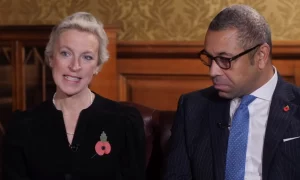A Cancer Diagnosis And The Impact On Loved Ones
- UK Foreign Secretary James Cleverly, 53, was devastated and brought to tears when his wife found out she had breast cancer.
- Susie Cleverly, 49, told Sky News she was diagnosed with triple positive breast cancer in 2021, after spotting dimpled skin under her right breast the month before.
- A cancer diagnosis is difficult news for not only the patient, but the family as well. SurvivorNet has resources to help you get through a cancer diagnosis with your partner.
Cleverly recounts telling his private secretary to cancel all his meetings the day his wife told him about her diagnosis and could barely speak when he asked if everything was alright.
Read More “I tried to say Susie [Cleverly] might have cancer, I just couldn’t get the words out, I couldn’t speak – I like to talk, but I just couldn’t speak,” Mr. Cleverly told Sky News, in an interview. Susannah Cleverly, 49, then had several mammograms and one scan found three lumps in her breast and a node in her arm. After an MRI the doctor found more than 12 lumps.
“I tried to say Susie [Cleverly] might have cancer, I just couldn’t get the words out, I couldn’t speak – I like to talk, but I just couldn’t speak,” Mr. Cleverly told Sky News, in an interview. Susannah Cleverly, 49, then had several mammograms and one scan found three lumps in her breast and a node in her arm. After an MRI the doctor found more than 12 lumps.
“I wasn’t that scared when they told me that,” Mrs. Cleverly told Sky News. “I think the most frightening thing was the word ‘cancer,’ so as soon as I was on board with having cancer, I just thought I’m going to get on with it.”
What Is Triple Positive Breast Cancer?
Women diagnosed with triple positive breast cancer have breast tumors with cancer cells that grow in response to estrogen (ER), progesterone (PR) and a protein called HER2 that grows on the outside of their cancer cells.
When a tumor is "hormone receptor-positive," it means that a pathologist has run special tests on the cancer to determine that it is positive for either the estrogen and/or progesterone receptor,” said Dr. Elizabeth Comen, who is a medical oncologist at Memorial Sloan Kettering Cancer Center.
When a certain type of cancer tests positive for being hormone-receptive, it means that the cancer needs the hormones estrogen and/or progesterone to grow. Your doctor will then determine what type of treatment is best for your type of cancer.
For patients with early-stage disease, meaning they have relatively small tumors and no lymph involvement, a number of HER2-directed therapies have dramatically changed the landscape. These include drugs like Herceptin and Perjeta.
Dr. Elizabeth Comen On Treatment for HER2-Positive Breast Cancer
While Mrs. Cleverly’s precise diagnosis is not clear, she tells Sky News she’s now had a mastectomy and is undergoing immunotherapy to reduce the risk of recurrence, “and is on a waiting list for reconstruction surgery.”
Her treatment she says left her very sick with a number of horrible side effects, such as infected hives, her face ballooning, and stomach and mouth ulcers.
But luckily, Mrs. Cleverly seems to be on the mend. Telling the news organization: “I feel great, I feel so much more like me.”
Seek Out Multiple Opinions
This might seem obvious, but highly respected doctors can sometimes disagree on the right course of treatment, and advances in genetics and immunotherapy are creating new options adding another layer to expert opinions.
Also, in some instances the specific course of treatment is not clear cut. That's even more reason why understanding the potential approaches to your disease is crucial.
National Cancer Institute Chief of Surgery Dr. Steven Rosenberg recommends seeking out multiple professional opinions to confirm a diagnosis and figure out the options.
Cancer Research Legend Urges Patients to Get Multiple Opinions
If you are newly diagnosed with cancer a clinical trial might be an option for you. SurvivorNet is pleased to offer a clinical trial finder. Take a look to see if any of them could be right for you or someone you know.
Coping With Your Emotions
The Cleverly’s have been married for 29 years and have two teenage boys, according to Sky News. Mr. Cleverly shares that family and friends have been “fantastic” throughout this process. Some even shaving their heads in solidarity.
“There was this massive wave of empathy and friendship, even from people I didn’t even know particularly well, that was really touching,” he said.
He admits there were a few times he thought he might lose his wife.
Holding back tears in the interview, he said: “I haven’t thought about my mortality, and certainly haven’t ever really given any thought to losing Susie, or what that might feel like – and then suddenly you get to confront that. And, we are close.”
Any relationship goes through its ups and downs, especially when something happens like a cancer diagnosis. In this episode of SurvivorNetTV's series, “SN & You. Mental Health and Relationships," survivors share how they handle their mental health and relationships while undergoing cancer treatment.
How to Fix Relationships When Depression Hits A Survivors Guide
Learn more about SurvivorNet's rigorous medical review process.


